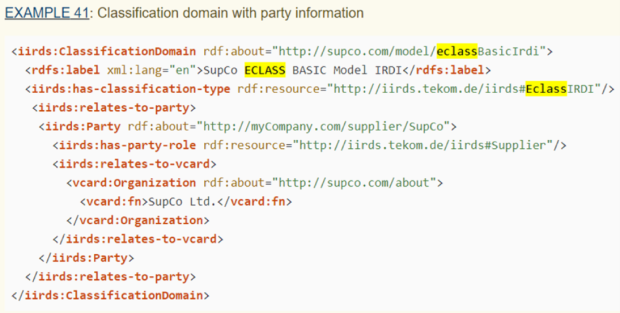What changes in the new version 1.2 of the iiRDS standard?
iiRDS is becoming increasingly popular in the industry and is being continuously developed by the iiRDS working group Development. parson has contributed to iiRDS since the beginning and provides expert iiRDS services.
On November 10, 2023, the new version 1.2 of iiRDS was released. We summarize the most important new features and changes for you:
iiRDS 1.2 – the most important changes
Links to external classifications
- External classifications that are not based on RDF can now be integrated into iiRDS. The classifications can be assigned to information units (e.g. topics), but also to product variants, product features, and components. The main purpose is to integrate metadata from these external classifications systems. Examples include ECLASS, CDD (IEC 61360), DCC (IEC 61355), and VDI 2770. This allows you to use the metadata of these standards without having to reproduce them in iiRDS.
Terminology information in iiRDS
- Terminology information on the iiRDS metadata is now available in iiRDS. Preferred and forbidden terms are specified in a supplementary file. For this purpose, iiRDS uses the Simple Knowledge Organization System SKOS. SKOS is a standard for taxonomies that is supported by numerous systems. The integration of SKOS is a first step towards modeling terminological information in iiRDS in a standardized and more harmonized way.
Harmonized terminology with IEC/IEEE 82079-1 and other changes
- The definitions of iiRDS classes and objects have been completely revised to make them easier to understand and to facilitate the use of iiRDS. In addition, the terms and definitions in iiRDS have been harmonized with the IEC/IEEE 82079-1 standard.
- There have also been numerous smaller updates: the documentation has been expanded, examples have been added, and bugs fixed. For example, the iiRDS classes have been made disjoint. That means that metadata concepts cannot overlap anymore, which makes iiRDS more robust.
Further informationen and downloads
- Read the news of the iiRDS working group.
- A detailed list of all changes can be found in the release notes.
- The new files are available for download here. Please note that you must be registered on the iiRDS site in order to download the files.
Intelligent informationen for smart content – with our support
Are you interested in delivering intelligent information to your users with the iiRDS standard? Use our knowledge and experience with the iiRDS standard. About parson's iiRDS services
Take advantage of our iiRDS training
Do you want to learn how to use iiRDS? We offer the right iiRDS training for every level.


